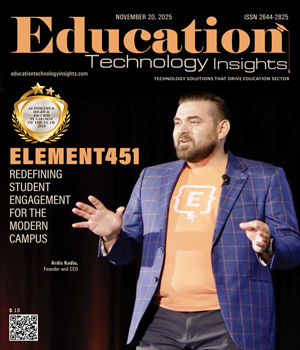THANK YOU FOR SUBSCRIBING
Be first to read the latest tech news, Industry Leader's Insights, and CIO interviews of medium and large enterprises exclusively from Education Technology Insights
Envisioning the Future of Ed-Tech
Jessica Sowalsky, Ph.D., Enterprise Learning Technology Systems Manager at University of Maryland
 Jessica Sowalsky, Ph.D., Enterprise Learning Technology Systems Manager at University of Maryland
Jessica Sowalsky, Ph.D., Enterprise Learning Technology Systems Manager at University of MarylandJessica Sowalsky, Ph.D., Enterprise Learning Technology Systems Manager at the University of Maryland, is a seasoned professional in the field of higher education focused on enhancing teaching and learning through educational technologies. She holds a Ph.D. in Education and has research interests in a number of subjects, including academic performance, application of learning theories to instructional products and human-computer interaction.
In an interview with Education Technology Insights, Sowalsky shares her insights into the trends and developments taking place in the education technology space and strategies to incorporate them into the learning systems.
Can you shed light on the strategies that can be adopted to enhance the accessibility of education in your institution?
At our university, we have employed a dedicated team to address accessibility concerns in courses. We utilize a specific tool integrated into our learning management system to scan courses for accessibility issues. This proactive approach enables the faculty to identify and resolve any potential challenges, thereby improving the overall quality of student education.
What are some of the significant challenges faced in the education sector, and how can they be addressed?
One of the significant challenges is maintaining student engagement. Leveraging technologies to tailor instruction to diverse learning styles will help address this issue. Staying abreast of the rapidly evolving technologies and adapting to the course content is imperative to meet the changing needs of students.
What is the significance of emerging technologies like virtual reality in transforming the e-learning space?
Virtual reality holds the promise of enhancing student engagement, offering an immersive learning experience. Technology is growing rapidly and integrating virtual reality into education provides students with interactive and stimulating environments that contribute to a better understanding of the course materials. Upcoming innovations like Metaverse have the potential to transform the way students interact in the classroom.
“Embracing new technologies can help improve the learning experiences in the classroom—both online and offline.”
How do you envision the future of e-learning with the emerging technologies accentuating its growth?
I foresee a shift toward kinesthetic learning. Classrooms are becoming more interactive through technologies and advanced strategies are being adopted to adapt to the changing education landscape.
Incorporating features like teleconferencing, classroom polling, and interactive quizzing can help create more engaging and compelling learning environments. Moreover, having faculty think outside the box and leverage information using these components will be crucial in transforming the learning space.
Can you suggest some impactful strategies that can be adopted by new educators to stay ahead of the curve?
Having institutions embrace new technologies can help improve the learning experiences in the classroom—both online and offline. Staying ahead of the latest trends while having faculty enable these tools in their classroom to adapt to various learning environments. Additionally, prioritizing security and accessibility is crucial. Fostering a collaborative environment where educators and students engage in interactive sessions will further help enhance learning. They can even make use of quizzes, discussions and message boards to keep students involved in learning the subject matter.
Read Also
The Power of International Education Collaborations
Designing Schools around Student Voice
What is Edtech Leadership in 2026
Designing Academic Leadership Around Real Lives
Why Student Success Begins with Being Seen
Inclusion is not a Department: The Systemic Ripple Effect of Belonging

I agree We use cookies on this website to enhance your user experience. By clicking any link on this page you are giving your consent for us to set cookies. More info

However, if you would like to share the information in this article, you may use the link below:
www.educationtechnologyinsightseurope.com/cxoinsights/envisioning-the-future-of-edtech-nid-2777.html






















